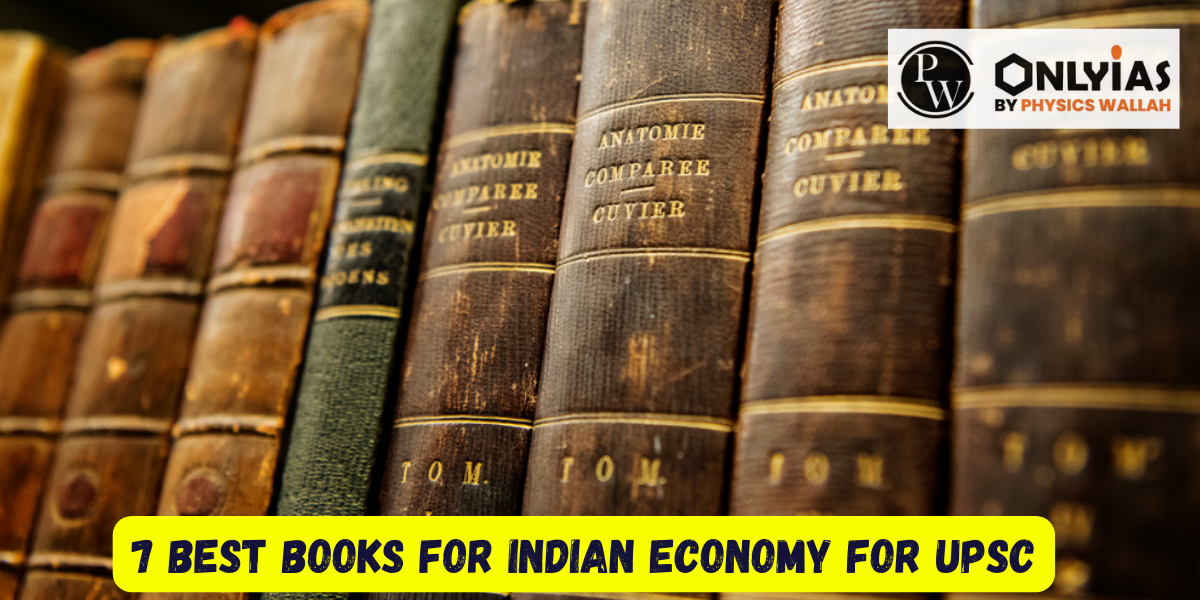
The Indian economy plays a pivotal role in shaping the country’s future and prosperity. Aspiring candidates preparing for UPSC and other Government examinations need to have a comprehensive understanding of the Indian economy to succeed in these highly competitive exams. While there are numerous resources available, books remain the most reliable and in-depth sources of information. In this article, we present the seven best books that cover various aspects of the Indian economy, offering valuable insights for UPSC and Sarkari Naukri preparation.

Best Books for Indian Economy for UPSC: Aspiring civil servants aiming to crack the prestigious UPSC (Union Public Service Commission) examination recognize the crucial importance of gaining a comprehensive understanding of India’s economic landscape. A deep grasp of economic concepts, policies, and developments is essential for candidates aspiring to serve the nation in various administrative roles. While the vastness of the subject may seem daunting, the right resources, such as books, serve as invaluable companions on this journey of preparation.
In this article, we will explore 7 best books for Indian economy, meticulously curated to aid UPSC aspirants in their quest for success and enlightenment. These books not only cover the fundamentals but also provide critical insights into the ever-evolving economic challenges and policy frameworks that shape India’s growth story.
Authored by Ramesh Singh, a renowned economist and academician, this book is a go-to resource for UPSC aspirants preparing for the Economy section of the Civil Services Examination. It covers all the relevant topics, including economic planning, fiscal policy, monetary policy, and major economic sectors. The book presents complex concepts in a lucid and easily understandable manner, making it an ideal choice for both beginners and advanced learners.

Uma Kapila’s book is a comprehensive compilation of essays and articles that provide an in-depth analysis of India’s economic journey since independence. Covering the economic policies, reforms, and challenges faced by the country, this book is an essential read for aspirants seeking to grasp the nuances of India’s economic development over the decades.

This book is tailored explicitly for aspirants preparing for the Civil Services Examination and covers the Indian economy in a well-structured and concise manner. It highlights recent economic developments, government schemes, and various sectors contributing to India’s growth. With practice questions and previous years’ UPSC questions, it aids in strengthening one’s grasp of the subject.

For those looking to grasp key economic concepts quickly, this book by K. Shankarganesh is a gem. It presents the subject matter in a question and answer format, making it a handy resource for quick revisions. It covers essential concepts related to national income, inflation, budget, and economic planning.

This book by N. K. Singh, a well-known economist and former bureaucrat, offers an in-depth understanding of economic policies and development strategies. It covers the economic history of India, post-independence economic policies, and emerging challenges in the contemporary context. This comprehensive book is particularly useful for candidates preparing for the Indian Economic Services (IES) examination.
Another excellent book by Uma Kapila, co-authored with Gaurav Datt, this text explores the various challenges faced by the Indian economy. It delves into issues like poverty, unemployment, income inequality, and provides insights into government policies to address these concerns. Aspirants will find this book valuable for gaining a holistic understanding of India’s economic landscape.
This book focuses on the dynamic relationship between the environment and economic policies. Aspirants will find it beneficial to understand the environmental challenges that the Indian economy encounters and the sustainable policies required for a balanced growth trajectory. It is particularly useful for candidates preparing for the UPSC Mains examination.
The Indian economy holds significant importance in the UPSC IAS exam due to several reasons:
1. Substantial Weightage: The Indian economy is a vital component of the UPSC syllabus, both in the Preliminary and Mains examinations. A substantial number of questions are asked from this subject, making it crucial for candidates to have a strong grasp of economic concepts and developments.
2. Relevance in General Studies: Economic issues are directly linked to various aspects of General Studies, including Governance, Polity, Environment, and Social Issues. Understanding the economic dimensions of these topics is essential for answering questions comprehensively.
3. Socio-Economic Policies: Aspirants aiming for administrative roles need to comprehend India’s socio-economic policies and their impact on the country’s development. Knowledge of the Indian economy enables candidates to analyze and formulate effective policies for addressing national challenges.
4. Current Affairs Perspective: The Indian economy is continuously evolving, and its analysis in the context of current affairs is crucial. UPSC aspirants must be aware of recent economic developments, government schemes, and global economic trends to answer contemporary questions.
5. Analytical Skills: Economics requires critical thinking and analytical skills to interpret data, understand economic indicators, and assess policy implications. These skills are highly valuable for the Civil Services Examination and for an administrative career.
6. Essay and Interview Preparation: The UPSC Mains examination includes essay writing, where economic topics often feature prominently. A sound understanding of the Indian economy helps candidates write well-structured and informed essays. Moreover, during the interview stage, questions related to economic issues may be asked, and knowledge of the subject can make a significant difference.
7. Real-Life Application: Economics is not just a theoretical subject; it impacts people’s lives on a daily basis. Understanding the Indian economy enables civil servants to make informed decisions that positively affect the nation’s citizens and businesses.
The IAS exam extensively covers the subject of economics in all three stages – Prelims, Mains, and the Personality Test. While NCERT books are vital for the preliminary examination, there are several other noteworthy economics books that can greatly benefit aspirants preparing for UPSC.
1. “Indian Economy” by Ramesh Singh:
This comprehensive book covers all aspects of the Indian economy and is highly recommended for UPSC Prelims and Mains preparation. It provides in-depth knowledge on economic concepts, policies, and current affairs related to the Indian economy.
2. “Indian Economy: Performance and Policies” by Uma Kapila:
For those seeking a detailed analysis of India’s economic development post-independence, this book is an excellent resource. It offers valuable insights into economic policies, reforms, and challenges faced by the country.
3. “Indian Economy: Economic Development and Policy” by N. K. Singh:
This book delves into India’s economic history and post-independence economic policies. Aspirants will find it helpful in understanding the dynamics of economic development and key challenges in contemporary times.
4. “Indian Economy: Environment and Policy” by Dutt and Sundaram:
With a focus on the relationship between the environment and economic policies, this book provides valuable insights into sustainable economic growth and development. It is particularly useful for the UPSC Mains examination.
5. “Macroeconomic Analysis” by Edward Shapiro:
For candidates opting for economics as their optional subject, this book is highly recommended. It covers essential topics such as national income accounting, macroeconomic theory, cycles, growth, and stabilization.
6. “Monetary Theory and Public Policy” by Kenneth Kurihara:
An excellent resource for economics optional subjects in UPSC Mains, this book offers a thorough examination of monetary theory and its implications for public policy.
7. Standard Newspapers – The Economic Times and Economic and Political Weekly:
Staying updated with current national and international economic affairs is crucial for aspirants. Regularly reading newspapers like The Economic Times and Economic and Political Weekly will provide valuable insights and analysis.
The Indian economy’s importance in the IAS exam cannot be overstated. To excel in Civil Service examinations, having a strong foundation in Indian economy is crucial. It serves as a foundational pillar for candidates aspiring to become effective administrators, as it allows them to comprehend, analyze, and address the economic challenges faced by the nation in its journey towards progress and development.
These seven best books offer a diverse range of perspectives, analyses, and explanations, helping aspirants gain a comprehensive understanding of the subject. Remember, in addition to reading these books, practice and consistent revision are equally important to excel in these competitive exams.
All the Major Sea Ports In India, PDF Download, Details, Map, Complete Major Ports List 2023
List of First in India in the fields of Science, Politics, Defence, Architecture, Sports, Awards.
"The Indian Economy" by Sanjiv Verma is one of the best books for non-economic background aspirants. It explains concepts with simple examples and follows the new UPSC exam pattern. Similarly, "Indian Economy" by Mishra & Puri is concise and comprehensive, making it ideal for UPSC preparation.
The Indian Economy holds immense significance in UPSC examinations as it features in both the General Studies Paper 1 of the UPSC prelims and the General Studies Paper 3 of the UPSC mains. Additionally, it serves as an optional subject in the Mains exam. Consequently, selecting the appropriate book to cover the syllabus becomes a critical decision for aspirants preparing for these prestigious exams.
The Indian Economy holds utmost significance in the UPSC Civil Services Mains exam for aspiring IAS candidates. In the market, several commendable books on Indian economy are available to aid preparation. Prominent titles include "Indian Economy" by Ramesh Singh, "Indian Economy" by Mishra and Puri, "Indian Economy" by Uma Kapila, and "Indian Economy: Problems, Policies, and Development" by Datt and Sundaram.
The UPSC Mains syllabus covers key aspects of the Indian economy, including planning, resource mobilization, growth, employment, budgeting, technology missions, land reforms, liberalization, and infrastructure. It aims to provide candidates with a deep understanding of India's economic landscape and development challenges.
<div class="new-fform">
</div>
